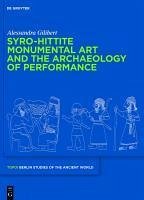The ceremonial centers of the Syro-Hittite city-states (1200-700 BC) were lavishly decorated with large-scale, open-air figurative reliefs an original and greatly influential artistic tradition that has captivated the imagination of its contemporaries as well as that of modern scholars. This volume explores how Syro-Hittite monumental art was used as a powerful backdrop to important ritual events, and it opens up a new perspective by situating the monumental heritage in the context of large public performances and civic spectacles of great emotional impact. The first part of the volume focuses on the sites of Carchemish and Zincirli, offering a close reading of the relevant archaeological contexts. The second part of the volume discusses the embedment of monumental art in ritual performance and examines how change in art relates to change in ceremonial behavior, and how the latter relates in turn to change in power structures and models of rulership.
Dieser Download kann aus rechtlichen Gründen nur mit Rechnungsadresse in A, B, BG, CY, CZ, D, DK, EW, E, FIN, F, GR, HR, H, IRL, I, LT, L, LR, M, NL, PL, P, R, S, SLO, SK ausgeliefert werden.
James F. Osborne in: American Journal of Archaeology 10/2012
"[...] Gilibert's book is a solid work that embeds a traditional art historical perspective into a more dynamic way at looking at the relationship between visual art and archaeological contexts in the process of reconstructing ancient ceremonial performances. This perspective is very innovative, especially for the study of ancient Near Eastern societies, and gives a multidimensional perspective on archaeological material that is now envisioned as part of a broader network of signifiers in which the material culture, the landscape, and the architecture are all connected in the cognitive schemata of the ancient people."
Nicola Laneri in: BMCR 2012.01.32









